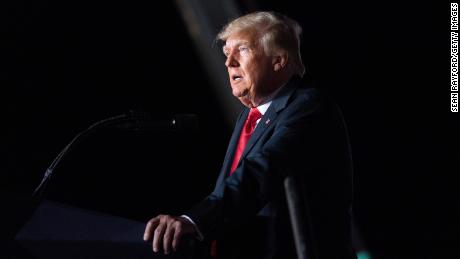Some were quick to speculate yes, though it’s not clear a former president could be charged by the Justice Department for mishandling documents, even classified information.
One former Trump adviser said it was highly possible that no criminal case would ever materialize, but added, “If I was Trump, I would be taking it seriously.”
There are clear laws that protect federal records — with varying degrees of likelihood in their application.
Here’s what legal experts tell CNN:
Can Trump keep or destroy government records after leaving the White House?
The Presidential Records Act of 1978 outlines the ways official records should be maintained during a presidency and turned over at the end of an administration.
Based on CNN’s and others’ reporting, it appears some of the requirements of the act may not have been followed during the Trump presidency. Instead, official White House records were ripped apart or flushed down toilets, and at least 15 boxes of records made their way to Mar-a-Lago. Some of the documents recovered from Mar-a-Lago in recent months contained records the National Archives believed were classified, according to The New York Times.
Legal experts tell CNN that any unauthorized retention or destruction of White House documents raises a red flag under a criminal law that prohibits the removal or destruction of official government records.
But for a charge like this to fly, prosecutors would need to show that Trump had “willfully” violated the law — a high bar, though one that prosecutors could potentially meet given the frequent efforts within the White House to try to preserve records Trump would habitually mutilate.
Furthermore, other criminal laws could come into play as well, if an investigation by the Justice Department progresses.
“If the intent was ‘Let me get these documents taken out of the way because they could look bad, they could be damning for me in an investigation, in a lawsuit,’ then you’re talking about potential obstruction of justice. So the devil will be in the details here,” said CNN legal analyst Elie Honig.
Are there other laws with teeth?
One criminal law prohibits destroying government property — provided the person charged intentionally violated the law.
As a former officer of the United States, Trump also has an ongoing obligation to protect classified information he received as president.
While in office, he had the ability to declassify, making his own decisions. But that power ended when he left the presidency, and it’s unclear whether he declassified any records held at Mar-a-Lago while he was still in office.
“If there was intentional, knowing destruction of classified documents, that’s a federal crime,” Honig said Thursday on CNN.
A national security adviser to President Bill Clinton, Sandy Berger, was prosecuted for removing classified documents from the National Archives by stuffing them into his pants during the 9/11 Commission investigation.
Even so, a case over the mishandling of national security secrets can get complicated quickly. That’s because there’s no central system in the federal government that standardizes what’s classified, and different agencies may have different views and make judgment calls on classification.
A Justice Department investigation would likely look into various agencies’ determinations on the records. Trump’s defense would be that he’s president, and governed them all, according to one legal expert who previously handled classification issues in the government.
What would Trump have to do to declassify documents?
This issue arose in court during Trump’s presidency, when news organizations pursued classified records related to the Russia investigation after the White House or Trump had publicly talked about declassifying them.
In one of the cases, Justice Department official Brad Weinsheimer said no order had materialized to declassify the Carter Page Foreign Intelligence Surveillance Act applications, which were the sought-after documents, even after official statements had suggested they could be released.
In another, then-White House chief of staff Mark Meadows said Trump’s tweets about declassifying documents weren’t “self-executing declassification orders,” and instead the decision-making stayed with a federal agency under Trump, according to a court filing.
Brad Moss, a lawyer who unsuccessfully sought declassification of the Page FISA warrant in court, said the President declassifying information requires his decision in writing. That could be as simple as crossing out the “classified” markings at the tops of pages or as formal as submitting documents to the White House Counsel’s Office, Moss said.
The questions that remain about classified documents at Mar-a-Lago, Moss says, are “Did he know? When did he decide to put those documents there? And did he take any action to declassify them before he left office?”
Could the Presidential Records Act prompt charges?
The law has no criminal enforcement mechanism, so in effect the act is “toothless,” said George Clarke, a Washington-based attorney who brought two lawsuits over the Trump White House’s records retention practices in recent years.
In his lawsuits, which were jointly pursued by the government watchdog group Citizens for Responsibility and Ethics in Washington, historians and archivists complained that notes and translations of Trump meetings with foreign powers, including Russian President Vladimir Putin, didn’t exist or hadn’t been preserved, and that White House staff used encrypted messaging systems for official business. But the courts threw out the cases, finding that judges had no authority to micromanage the presidency.
“It’s so frustrating,” Clarke said, looking back at his lawsuits. “All the cases we brought were pointing out how bad the record-keeping was and how many times they violated it. The courts didn’t bite.”








